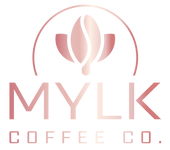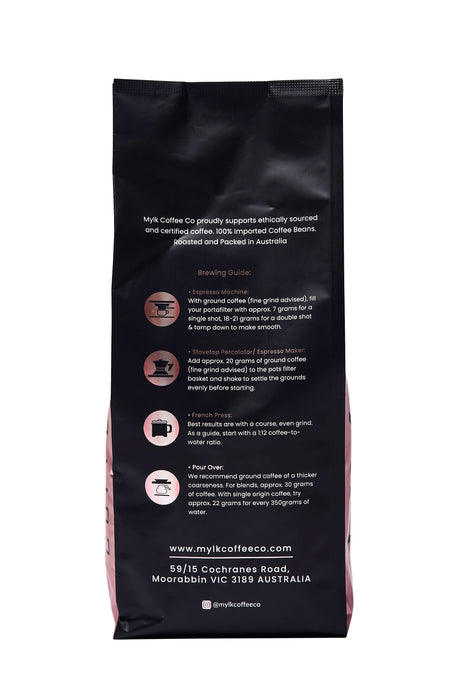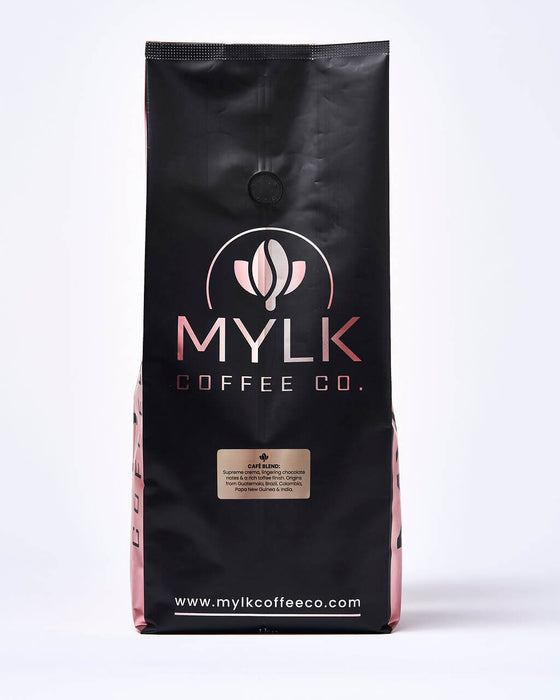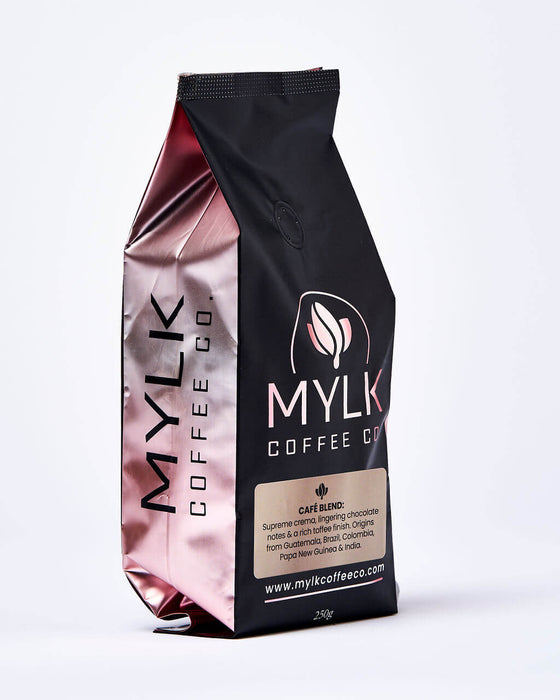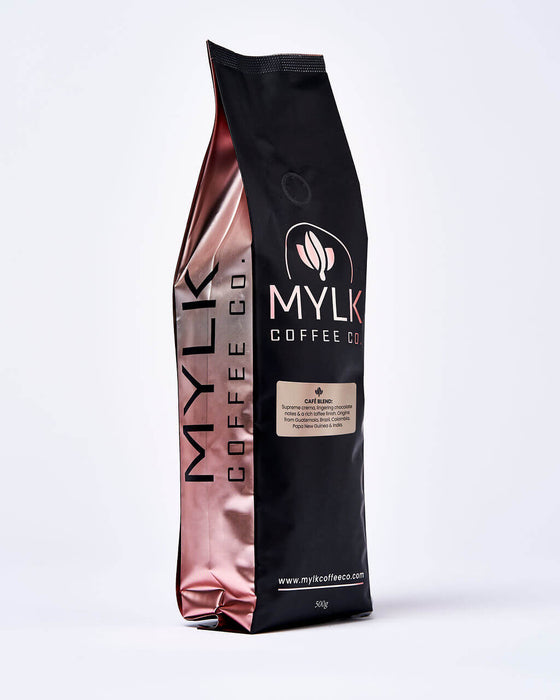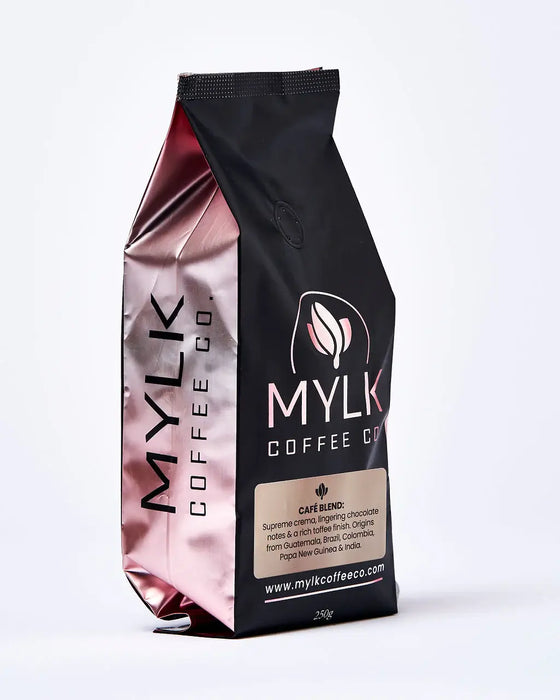
Cafe Blend Coffee Beans
MYLK Cafe Blend Coffee Beans
Cafe Blend coffee beans are the coffee beans of choice in our cafe headquarters in Melbourne. They feature a full-bodied coffee flavour with supreme crema, lingering chocolate notes and a rich toffee finish. These coffee beans are available online and feature an exotic blend of the very best of Guatemalan, Brazilian, Colombian, Papa New Guinean and Indian coffee beans.
Cafe Blend coffee beans are a popular choice among coffee enthusiasts and professionals alike. All beans are carefully selected and roasted to produce a unique flavour profile that is both rich and complex.
One of the key factors that set Cafe Blend coffee beans apart is the roasting process. The beans are typically roasted to a medium-dark level, which enhances the natural flavours of the beans while also adding a hint of caramelization and bitterness. This roast level also results in a fuller body and a long, satisfying finish.
The roasting process is just one part of the overall coffee-making process that affects the final flavour profile of the coffee. Other factors include the quality and origin of our beans, the brewing method, and the water temperature and pressure used.
What Makes MYLK Cafe Blend Coffee Beans Different?
At MYLK, we use only the highest-quality beans that have been carefully sourced and roasted. This will ensure that you get the best possible flavour from your coffee.
It's worth considering the brewing method you'll be using. Cafe Blend coffee beans are versatile and can be brewed using a variety of methods, including drip, French press, and espresso. However, different brewing methods can bring out different aspects of the coffee's flavour profile, so it's worth experimenting to find the method that suits your taste preferences best.
If you're new to brewing coffee at home, it's also worth investing in a good grinder. Grinding your beans just before brewing can help to preserve the flavour and aroma of the coffee, ensuring a fresher and more flavorful cup.
Serving
When it comes to serving Cafe Blend coffee, there are a few things to keep in mind. To really enjoy the full flavour of the coffee, it's best to drink it black or with just a splash of milk. Adding sugar or other sweeteners can mask the subtle flavours of the coffee and detract from the overall experience.
Summary
Overall, Cafe Blend coffee beans are a popular and versatile choice for coffee lovers everywhere. Whether you're brewing at home or in a professional setting, these beans offer a balanced and satisfying flavour profile that is sure to please. With a little experimentation and attention to detail, you can enjoy a delicious cup of MYLK Cafe Blend coffee any time of the day.
Home Brewing Guide
Espresso machine
With ground coffee (fine grind advised), fill your portafilter with approx. 7 grams for a single shot, and 18-21 grams for a double shot. Gently tamp down to make smooth and even.
Stovetop Percolator/ Espresso Maker
Add approximately 20 grams of ground coffee (fine grind advised) to the pot's filter basket and shake to settle the grounds evenly before starting. No need to tamp down hard when filling the basket.
French Press
Best results are with a course, even grind. As a guide, start with a 1:12 coffee-to-water ratio.
Pour Over
We recommend ground coffee of a thicker coarseness. For blends, approximately 30 grams of coffee. With single origin coffee, try approximately 22 grams for every 350 grams of water.
Grading, Cupping & Scores
Specialty Coffee often has references to coffee grading and coffee cupping scores.
How is Coffee Graded?
Coffee beans are graded to judge the relationship between coffee beans with imperfections and the resulting coffee’s quality. Coffee is rated on a scale of one to five based on the number of defects in the beans. Examples of primary defects include sour beans, a pod or cherry, or stones or sticks found in the batch. Secondary defects can include husk, broken or chipped beans, or damage as a result from insects.
Grade 1 coffee is considered Specialty Coffee. To classify as a Grade 1 specialty coffee, both the beans and resulting cup must be tested, assessed and reviewed. Specialty coffee beans may only have up to 3 full defects and must be consistent in size during review. Beans must also display uniqueness in one or more either taste, acidity, body, and/or aroma.
What is coffee cupping, and why is it important for specialty coffee?
Coffee cupping is the process used by coffee producers, buyers, and graders to evaluate coffee aroma and flavour profile. As part of the cupping process, freshly roasted beans are immersed in hot water, ensuring all grounds are fully wet and left to steep for 3-5 minutes. The cup is then stirred, and any foam is removed before cooling. Cupping, coffee professionals, and roasters review each cup in multiple categories including fragrance/aroma, flavour, aftertaste, acidity, body, balance, uniformity, clean cup, sweetness, defects, and overall.
What is a good score when cupping coffee?
Cupping scores are the scores assigned to a cup based on a cupping evaluation of the brew. Coffee that scores 80 points or above is considered specialty coffee, and anything less than 80 points is not considered specialty coffee. For specialty coffees scoring more than 80 points, additional levels of quality continue to differentiate coffee. Specialty Coffee that achieves a cupping score of 90 or more is considered truly exceptional!
